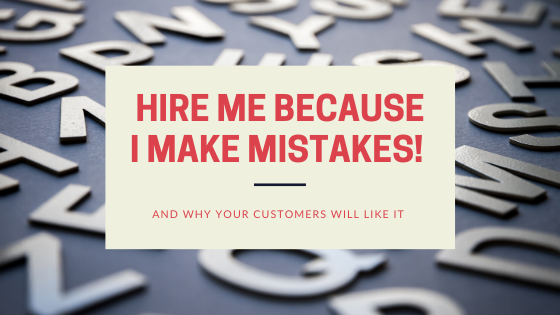AIIC Italy News
29/06/2020
Hire me, because I make mistakes! - Raffaella Marchese
Raffaella Marchese

Hire me, because I make mistakes!
AND WHY YOUR CUSTOMERS WILL LIKE IT
Events planners are second to no-one when it comes to inventiveness
MICE industry professionals are a very creative breed, one that doesn't get easily discouraged. Yes, the sudden outbreak of COVID caught them by surprise. But, it didn't take long before they started showing the gumption one would expect of them. Today, the conference industry is fizzing with original initiatives. Take filming studios for hybrid/virtual events. Three months ago, these were nothing but a cottage industry for a tiny segment of clients. Today they are ushering in the future of a sector that might very well never go back to what it once was.
Innovation is everywhere
Trade magazines are effervescing with news about innovative apps for virtual audience engagement with integrated gaming tools to entertain virtual conference-goers between presentations. Some event planners are providing their corporate customers with imaginative ways to deliver the same sweet and savoury supplies to their attendees for a shared experience during coffee-breaks. Increasingly event organisers realise that providing high-quality simultaneous interpretation is not only a more inclusive approach - by creating a level playing field where everyone has the same opportunity to express their views - but it is also conducive to extended and more profitable engagement. Attending an online conference can be tiring and frustrating if your mother tongue is not the language used by the speakers. This is not a question of goodwill, but simply science.
Automated translation tools for conference management platforms
Recently I came across a comprehensive virtual conference management system, offering best-level technology for audience engagement and analytics. It is undoubtedly the dream tool for any large corporation ready to invest good money to reach out to their target and reap the resulting profits. The company behind the platform was proud to announce a freshly introduced simultaneous translation feature. That's great - I thought - now we’re talking! The industry is paying heed to what we have been saying for ages. It took me a few seconds to realise they were talking about an automated translation tool. My heart sank.
You will like me more than a machine
I could list several reasons why an automated translation tool is not good enough for a top-notch company serving the most demanding clients. Several scholars, including David Lapakko(1), have challenged the validity of the often abused and misreported theory by Mehrabian & Ferris (1967) that only 7% of any communication is verbal. It is, however, unquestionable that translating - and conference interpreting in particular - is not a mere exercise of putting one word after the other in a different language. In my opinion, competent interpreters are first and foremost experts in communication. The fact they juggle multiple languages while they deliver their communication service is just an additional feature of their trade. When you interpret, there is so much else going on. It's an act of human empathy. You become the voice of the person you are interpreting, and the words you choose must resonate with the speaker's communication intent. As a professional interpreter, you look for the real meaning of any utterance. You dismantle and reassemble sentences to make sure your listener optimally receives the original message. And yes, at times we make mistakes in the process because we can have a hard time with strong accents, light-speed deliveries, numbers or technical terms we have never come across before. But unlike machines, we cling to context. It's the context that helps us realise we might have been wrong-footed and gives us ways to amend those slips of the tongue. Your clients will appreciate the human side of this highly cognitive reprocessing and will trust the final result. When machines get things wrong - and believe me they do and they make hilarious mistakes - they carry on, leaving your listener baffled and bewildered.
I will take you to the other side of the river
During my training as an interpreter, my mentors taught me that you have a few sentences to gain the trust of your listeners. It takes them a few utterances to feel your self-confidence, to appreciate your tone of voice, to decide you are the waterman (or woman) who will take them to the other side of the river. Your task is to nurture that initial trust by making your listeners feel part of the event they are attending and never let them down.
I could argue that only flesh and blood interpreters understand humour and metaphors. They make sense out of ill-constructed semantics (how many times has a speaker told us, "what you said sounds so much better"?) They are sensitive to cultural differences and differentiate among the multiple meanings words can have. Linguists realise what grammatical structures refer to (the company reported to clients about their misconduct; whose misconduct are we talking about?) Machines mechanically spin out word after word; they never question themselves; they don't apply any healthy self-doubt to double-down on meaning when the game gets tough.
Yeah…but an automated machine is cheaper
You are spot on. Professional interpreters will never compete with a for-free 16-language automated machine tool when it comes to price. But as with any other issue, it boils down to the investment that will prove right for your event. I suspect no event manager will ever consider serving fast-food to her premium customers, and fast-food is undoubtedly more affordable than a scrumptious dinner by a Michelin-starred chef. Plus, does one really need 16 languages for a regular conference presentation? Audience segmentation tools should provide event planners with reasonably good visibility on the target audience and allow for adequate planning.
If you are not convinced yet...
You might consider asking Alexia to order you some paper for printing. It’s convenient, even fun to do this, but I guess you will still prefer a laugh at the pub with your pals. Indeed, when it comes to communication, no machine can beat a human brain. If you are thinking of ‘serving’ your conference audience with machine translation, I suggest you exercise your inherently social skill and challenge your beliefs. And if I haven't convinced you, try watching this.
__________________
(1) Lapakko, D (2007), Communication is 93% Nonverbal: An Urban Legend Proliferates, https://cornerstone.lib.mnsu.edu/cgi/viewcontent.cgi?article=1000&context=ctamj. 